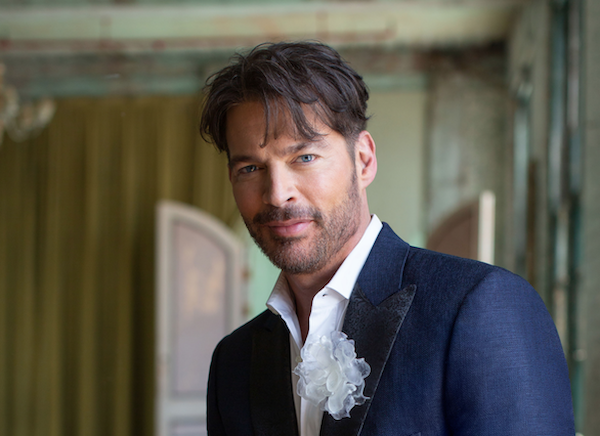Jan 13, 2026 2:09 PM
More Trump-Kennedy Center Cancellations
The fallout from the renaming of the John F. Kennedy Center for the Performing Arts to include President Donald…

Harry Connick Jr. explores the work of Cole Porter, who he calls “the consummate musician and the consummate wordsmith,” on True Love: A Celebration Of Cole Porter is due out Oct. 25.
(Photo: Courtesy Verve Records)Cross-pollination comes naturally to Harry Connick Jr.
The New Orleans artist invites different facets of his artistry to inform one another, a practice that’s earned him both Grammy and Emmy awards, and multiple Tony Award nominations.
This past year, he returned to his studio roots to record True Love: A Celebration Of Cole Porter—the pianist, singer and master orchestrator’s first album on Verve, which is set for release Oct. 25. Featuring his core outfit, additional horns and a full orchestra, the recording showcases Connick’s original treatment of 13 Porter selections from nearly as many musicals, including Anything Goes, High Society and Jubilee.
Following the album’s release, previews for Connick’s forthcoming Broadway production, A Celebration of Cole Porter, are set to begin Dec. 7. The show features live music, theatrical choreography, contributions from lighting master Ken Billington and set designer Beowulf Boritt and, according to the artist, “a lot of surprises.”
“By the time you leave [the theater], you’ll have heard a lot of really great Cole Porter songs, hopefully in a way that makes you think about them [differently],” said Connick while in conversation with The Wall Street Journal’s Marc Myers during a Sept. 25 listening event in New York.
Over the years, Connick has gotten inside the music through countless composers and bandleaders, but his connection to Porter proves distinctive.
“[Porter] wasn’t unique in terms of writing his own words and music,” said Connick, “but he was the consummate musician and the consummate wordsmith. His lyrics could be poetic and complex, even inaccessible sometimes. But they could also be laid out on the table for anyone to interpret right away.”
From Connick’s perspective, Porter often would strengthen lyrical impact through musicianship and compositional devices; he cited Porter’s use of appoggiatura in “Mind If I Make Love To You” as an example of his playful genius. “[Porter] would intentionally put a wrong note on the most dominant part of the rhythm, just to create tension to make you feel a subliminal sense of discomfort,” Connick said. “And then he would resolve it.”
Taking cues from the composer, Connick allowed Porter’s lyrics to guide much of the recording, from song selection right down to choice of tempo—as is the case for Connick’s arrangement of “Just One Of Those Things.”
“You don’t just write an arrangement,” he told DownBeat following the listening session. “You write stuff that supports the content of the lyric.”
Connick described the song’s bridge lyric as ingenious: “I really wanted to take time to let people—and myself—digest what [Porter] was saying. I was so pleased when my bass player, Neal [Caine], came up to me and said, ‘Bro, I’ve played this song a thousand times and I’ve never thought about these words.’”
Other instances of lyric-driven orchestration pervade True Love, including a particularly climactic moment during “Mind If I Make Love To You,” when Connick introduces portamento, or a slide from one note to another. He recalled an amiable exchange during the recording session with concert master and close friend Bruce Dukov who, at first, appeared reluctant about the choice, but ultimately embraced Connick’s orchestration. “I said, ‘This guy is asking this woman to make love to him,’” Connick said, referencing the story’s plot. “‘If you were to say that with your violin, that’s how you would say it.’”
Citing masters Duke Ellington and Billy May, Connick offered a philosophical perspective on exploring Porter’s canon, and on the future of large ensemble music—the music he’s come to love, honor and respect.
“I’ve gotten to the point where it’s easier for me to [understand], no matter how complicated it is, it still should feel good,” he said. “It takes a long time to develop that kind of maturity. Even though it’s a traditional form, this music still has the potential, for me, to be very new.” DB

Belá Fleck during an interview with Fredrika Whitfield on CNN.
Jan 13, 2026 2:09 PM
The fallout from the renaming of the John F. Kennedy Center for the Performing Arts to include President Donald…

Peplowski first came to prominence in legacy swing bands, including the final iteration of the Benny Goodman Orchestra, before beginning a solo career in the late 1980s.
Feb 3, 2026 12:10 AM
Ken Peplowski, a clarinetist and tenor saxophonist who straddled the worlds of traditional and modern jazz, died Feb. 2…

The success of Oregon’s first album, 1971’s Music Of Another Present Era, allowed Towner to establish a solo career.
Jan 19, 2026 5:02 PM
Ralph Towner, a guitarist and composer who blended multiple genres, including jazz — and throughout them all remained…

Rico’s Anti-Microbial Instrument Swab
Jan 19, 2026 2:48 PM
With this year’s NAMM Show right around the corner, we can look forward to plenty of new and innovative instruments…

Richie Beirach was particularly renowned for his approach to chromatic harmony, which he used to improvise reharmonizations of originals and standards.
Jan 27, 2026 11:19 AM
Richie Beirach, a pianist and composer who channeled a knowledge of modern classical music into his jazz practice,…